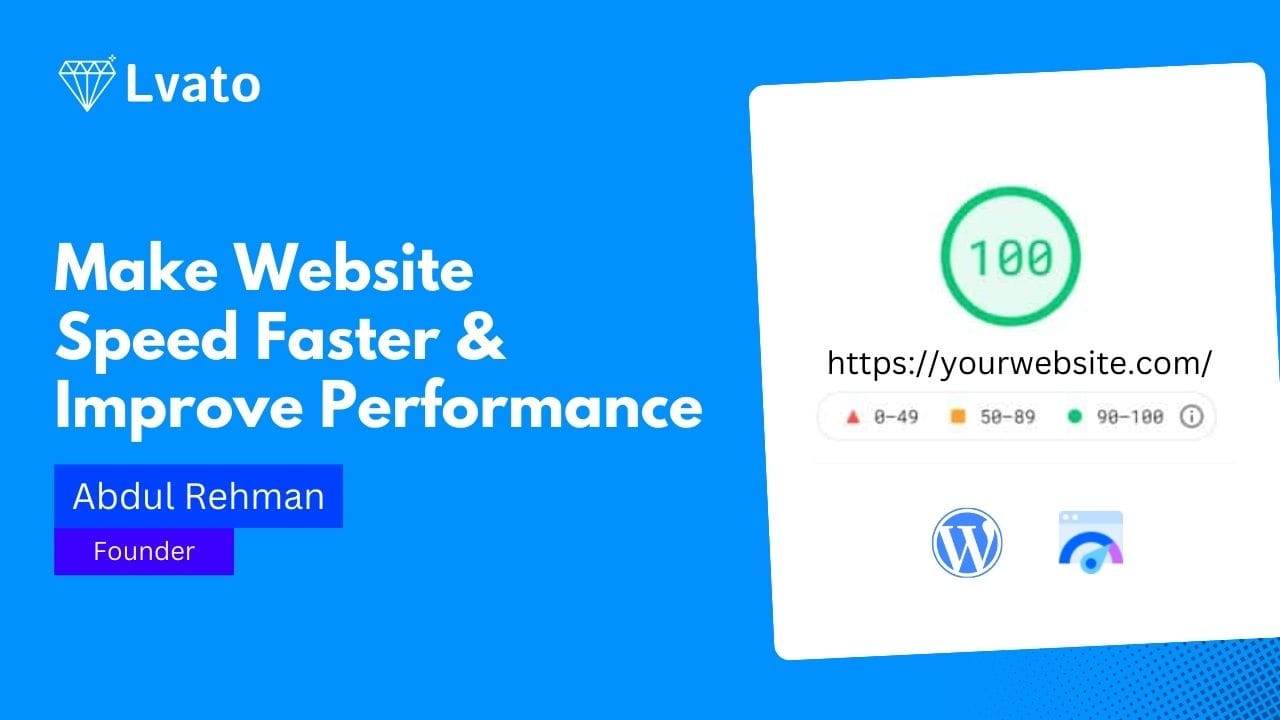Website speed is a critical factor in delivering a great user experience and improving your website’s overall performance. A fast website not only helps in reducing bounce rates but also boosts your SEO rankings, improves conversion rates, and enhances customer satisfaction. In this guide, we’ll explore several best practices to help make your website faster and more efficient.
1) Introduction
In the digital age, users expect websites to load instantly. Even a delay of a few seconds can cause users to abandon a site, leading to lost potential customers and decreased engagement. Therefore, optimizing your website’s speed should be a top priority. By following a few essential practices, you can significantly reduce load times and improve performance.
2) Choosing the Right Web Hosting
One of the most crucial factors in website speed is your web hosting provider. A reliable hosting service ensures smooth performance and high uptime.
Lvato offers some of the best web hosting solutions, ideal for speeding up your site. With Lvato, you get:
- Free CDN: Automatically boosts your site’s speed by distributing content globally.
- Super-fast load times: Ensures that users experience minimal wait time when visiting your site.
- 99.99999% uptime: Your website will run smoothly, reducing any potential downtime that could harm your business.
Choosing the right hosting can make or break your website’s performance, so invest wisely.
3) Optimizing Images
Images often account for the bulk of the data on websites. Optimizing them properly can drastically improve load times.
- Avoid Overloading Images: Don’t overburden your website with unnecessary images. Use only the ones you need to communicate your message.
- Resize Images: Upload images at the required dimensions. Oversized images consume more bandwidth and slow down load times.
- Use SVG for Illustrations: Instead of using raster images (like PNG or JPEG) for icons and illustrations, use SVG, which is scalable and lightweight.
- Compress Images: Tools like TinyJPG and TinyPNG can significantly reduce the size of your images without sacrificing quality.
- Lazy Loading: Enable lazy loading to load images only when they’re needed. This prevents all images from loading simultaneously, which can slow down your website.
4) What is Caching & Plugins?
Caching helps store copies of files in temporary storage, reducing the need to repeatedly generate content for every user. Below are some popular caching plugins:
- WP Rocket: A premium plugin with a wide range of features, including page preloading, file compression, and combining/minifying CSS and JavaScript files. If you can afford it, WP Rocket is an excellent investment for speeding up your WordPress site. Here’s a guide to set it up:
- Preloading pages: Enable in the settings for faster initial loads.
- Compression settings: Compress files to reduce their size.
- Combining and minifying: Combine CSS/JS files to reduce the number of HTTP requests.
- W3 Total Cache: A free alternative to WP Rocket that offers caching, minification, and other performance-boosting features. You can set up W3 Total Cache to compress and minify HTML, CSS, and JavaScript. Here’s how:
- Enable Page Caching for faster content loading.
- Set up Minify to reduce file sizes.
- Use Browser Caching to leverage cached versions for returning visitors.
- Redis Object Cache: This server-level caching tool stores frequently accessed data in the server’s RAM for faster access. If you’re using a VPS Hosting from Lvato, you can install CyberPanel (using the guide below), which supports Redis Object Cache. Once installed, simply activate the Redis plugin in WordPress, and you’re good to go.
- Object Cache Pro: For large websites or e-commerce sites, Object Cache Pro works alongside Redis to offer advanced caching features, significantly boosting site performance. It’s recommended for websites with complex data handling and higher traffic.
5) CDN for Images
A Content Delivery Network (CDN) helps deliver your images and other static files faster by serving them from servers located closest to your visitors. If you’re using Lvato hosting, the great news is that it comes with a free CDN that you can activate directly from the control panel under CDN Web Optimization settings.
If you’re not using Lvato, consider third-party CDNs like:
- BunnyCDN: Fast and affordable CDN for delivering images.
- ImageKit: Ideal for optimizing and delivering images quickly, particularly for e-commerce or media-heavy websites.
6) Preload DNS
DNS resolution can take time, especially if your website loads resources from multiple external sources. To save precious seconds, you can preload DNS for external resources by adding the following code to your HTML HEAD:
<link rel="dns-prefetch" href="//yourdomain">This helps browsers start resolving DNS early, making the resource loading faster.
7) Cloudflare CDN Setup & Tricks
Cloudflare is one of the most popular CDNs and offers a free tier that provides substantial performance improvements. Below are some tips for setting it up and using its features:
- Enable Cloudflare CDN: Once your domain is added, activate the CDN feature to deliver your website’s content via Cloudflare’s global network of servers.
- Use Auto Minify: In Cloudflare’s settings, enable auto-minification of CSS, JavaScript, and HTML to reduce file sizes.
- Browser Caching: Set up browser caching rules to let users load files from their local cache rather than re-downloading them on each visit.
- Rocket Loader: Cloudflare’s Rocket Loader speeds up rendering of JavaScript-heavy pages by loading scripts asynchronously.
By following these steps and practices, you’ll ensure that your website is not only faster but also provides an improved user experience. A fast website is key to retaining visitors, improving SEO, and ultimately driving more conversions. So, take the time to optimize your website, and you’ll see the results in performance and user satisfaction.

